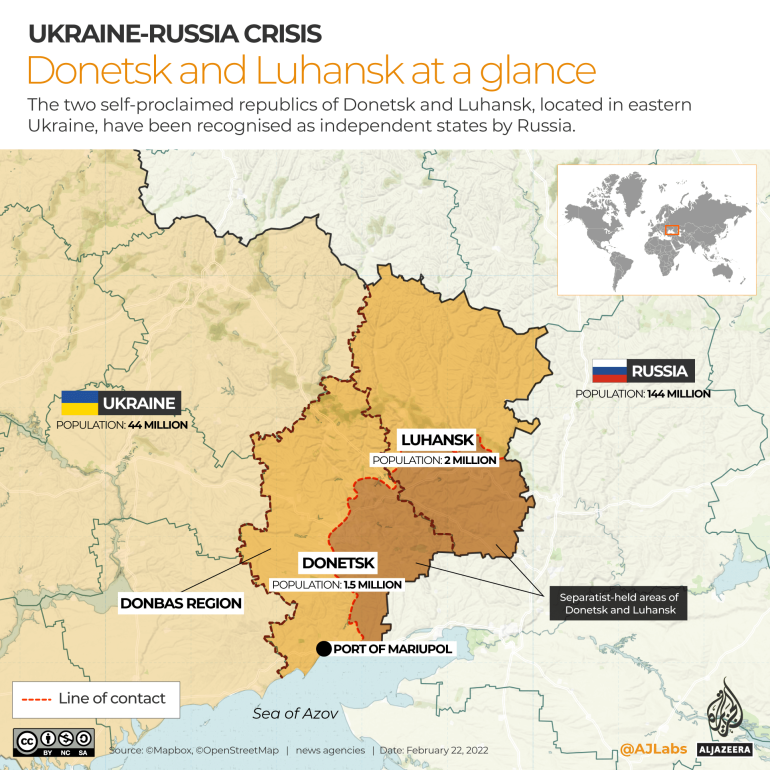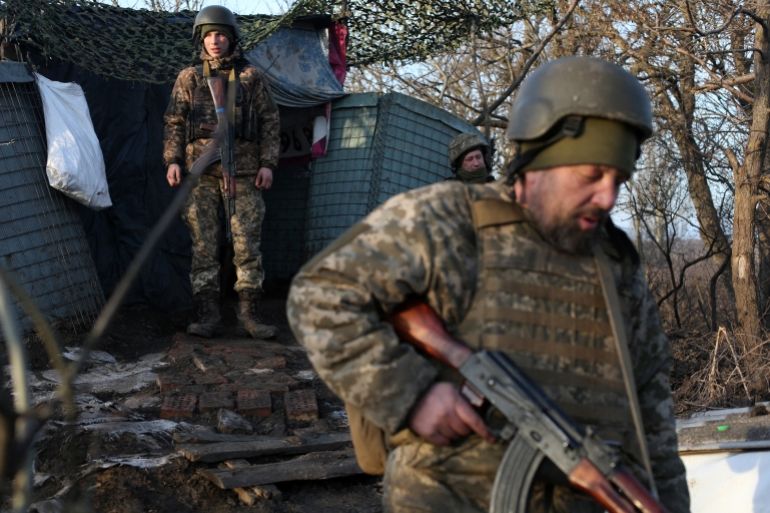
Ukraine crisis: Why is Macron taking on the role of mediator?
An hour before he told the world about his decision to recognise the independence of Ukraine’s two breakaway provinces of Luhansk and Donestk on Monday, Vladimir Putin called Emmanuel Macron.
It was a courtesy call to inform him of his intentions – and a dampener for the French president, who was quick to condemn the Russian president’s decision.
Only a day before, the Elysée Palace had proudly announced that France had managed to negotiate a summit between the US and Russian presidents, “if Russia didn’t invade Ukraine”.
The French president is Europe’s de facto leader in January as he holds the presidency of the Council of the European Union.
Most of his days in recent weeks have been dedicated to consulting his European and American allies, as he engages in shuttle diplomacy between the Kremlin and the West.
“For the last few weeks, Macron has appeared as a bridgehead of the European diplomacy”, said Carole Grimaud Potter, a professor of geopolitics at the University of Montpellier. “However, he doesn’t emphasise too much on the European dimension of his approach because Vladimir Putin despises the European Union and favours bilateral relations.”
Since the 44-year-old French centrist rose to power in 2017, he has been trying to build a personal relationship with the Russian leader.
Lately, he has exploited the relative void created by Angela Merkel’s departure from power last December. The Russian-speaking former German chancellor, who had governed over Europe’s top economy for 16 years, was Putin’s go-to interlocutor in the EU.

A week into his presidency, Macron invited Putin for a pompous meeting at the Palace of Versailles, signalling his ambition to “reset” the France-Russia relations. Two years later, he hosted the Russian president at his holiday residence on the French Riviera.
At the time, Macron hoped to “re-establish a close relationship between Russia and Europe”; a move criticised by some in the European Union, especially in the East where hostility towards Russia runs high.
France and Russia, a long history
France and Russia have had close ties for a long time.
In 1892, the Russian Empire and the French Republic forged an alliance – the first for France with another European nation since the collapse of Napoleon Bonaparte’s empire in 1814 – that lasted until the October Revolution of 1917, in the middle of World War I.
During the Cold War, two months after leaving NATO’s command structure in 1966, French President Charles de Gaulle signed a series of cooperation agreements with the USSR during a 10-day visit that took him from Moscow to Baikonur, in Kazakhstan, where he was the first Western head of state to witness the launch of a Soviet satellite.
When Russian forces invaded Georgia’s region of South Ossetia in August 2008, then-President Nicolas Sarkozy rushed to Moscow and Tbilisi to broker a ceasefire.
Like Macron today, he held the presidency of the European Council at the time.
“The coincidence has been noted on the Russian side. They remembered Sarkozy’s role in mediating the 2008 crisis. France has a special spot in the heart of many Russians and both countries have deep historical and economical ties. Macron has played that card well,” said Grimaud Potter.
What’s Macron trying to achieve?
When Russia’s Foreign Minister Sergey Lavrov met his US counterpart Antony Blinken in Geneva last month to discuss Europe’s security architecture, many in Europe were both shocked and concerned they did not have a seat at the table.
He also made a visit to Moscow and Kyiv in early February and held a frenzy of phone calls with all the main players of the crisis during the last few weeks.
“He wants to own the paternity of a de-escalation in eastern Ukraine, if not a resolution of the crisis,” said Grimaud Potter.
But the Kremlin’s decision to recognise the “republics” is a serious setback in that fight.
Russia’s move renders as irrelevant the Minsk II agreements, negotiated by France and Germany in 2015 to solve the situation in eastern Ukraine, even though they were never fully implemented.
The EU, the US and the UK have swiftly imposed limited sanctions in order to keep a door open for diplomacy and prevent an all-out war in Ukraine.
“Macron’s goal is to initiate a dialogue on NATO’s role in Europe and Ukraine, and potentially a new treaty on arms control, some sort of Helsinki Accords 2.0. He knows it will take time and that NATO and the EU will have to give in to some of Russia’s demands, who wants to guarantee its security and restore the might it lost when the USSR disappeared,” said Grimaud Potter.
 Servicemen of the Ukrainian Military Forces walk on the front line with
Russian-backed separatists near Novohnativka, Donetsk region, on
February 20, 2022
Servicemen of the Ukrainian Military Forces walk on the front line with
Russian-backed separatists near Novohnativka, Donetsk region, on
February 20, 2022
This crisis is unfolding as Macron faces an unpredictable re-election campaign for a second five-year term in April.
He has not yet declared his candidacy, but is widely expected to do so soon.
“The tensions in Ukraine are very timely,” said Rémi Lefebvre, a professor of political science at the University of Lille.
“Macron had originally planned to use the French presidency of the EU Council to restore his presidential stature ahead of the elections, to project strength and political will. Now, the situation in Ukraine enables him to ‘stand above the scrum’ and play a key role on the world stage.”
Overshadowed by the COVID-19 pandemic, France’s presidential campaign has not really started: the left is in disarray, the far-right is locked in a leadership contest between Marine Le Pen and Eric Zemmour, and the conservatives are losing steam.
“All this and the Ukraine crisis allows Macron to run a very short campaign, on ‘blitzkrieg mode’, which is precisely what he had hoped for,” said Lefebvre.
The French president’s diplomatic activism projects the idea that the country still holds its rank on the international scene – and that only he can protect the country’s best interests.
“So far, he has benefitted politically from the situation in eastern Ukraine. But if for some reason, and there are many, this crisis turns into a war of some kind, he could be blamed for it,” Lefebvre said.
Only a few hours after Russian forces reportedly moved into Donbas, Macron’s most serious political opponents were already mocking the “naivety” of the French president in his relationship with Putin and accusing him of “weakening” France.











